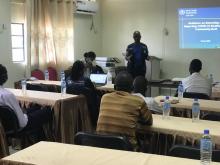South Sudan strengthens reporting of deaths due to COVID-19
Since the start of the coronavirus 2019 (COVID-19) pandemic in South Sudan, the Ministry of Health through its call centre, interactions with community resource persons, the media, and other informal sources have been receiving reports of unexplained deaths in communities.
To address the anecdotal reports of increasing mysterious community deaths that are currently not well investigated amidst concerns of safety during burial as raised by the general public, the Ministry of Health in collaboration with WHO and partners set up a COVID-19 mortality surveillance team.
The team will support the collation of information on COVID-19 death alerts from several key sources.
“Understanding the number of lives lost to COVID-19 will help us to know the scale and progress of the outbreak and make an informed decision both individually and collectively”, said Dr Richard Laku, the Incident Manager for the COVID-19 Response at the Ministry of Health.
In South Sudan, it is common and traditional for families, friends and the community to express condolences, offer comfort and support by attending the funeral, burial and memorial service. These events significantly compromise social distancing requirements and are the principle risk of COVID-19 spread associated with funerals.
With COVID-19, the risk of infection from human remains is low and related to contact with infected fluids and contaminated linen or surfaces. Nevertheless, the safety of everyone that handles bodies should be a top priority.
South Sudan declared its first case of COVID-19 on 5 April 2020 and registered 1 830 cases and 32 deaths (13 facility and 19 community deaths) with case fatality rate (CFR) of 1.75 %. As of 18 June 2020, at least 16 counties have been affected across the country and Juba city is the most affected with at least 1 657 confirmed cases.
In response to the outbreak, the Ministry of Health with support from WHO, other UN agencies, US Centers for Disease Control and partners have scaled up prevention and response activities.
Last week, the Ministry of Health in collaboration with WHO and South Sudan Red Cross trained 19 national and state-level Ministry of Health public health officers on reporting of deaths due to COVID-19.
The professionals trained on collecting information on alerts of COVID-19 deaths from the community in collaboration with the call centre, surveillance officers, hospital mortuaries, and other community resource persons; investigating and collecting samples from all reported COVID1-19 deaths and ensure that all new deaths due to COVID- 19 are integrated into the master database in the Public Health Emergency Operations Centre (PHEOC).
“Verification of death can be performed by professionals trained to do so in line with the Ministry of Health guidelines. We are now well equipped to track and verify the unexplained deaths in the community to measure the impact of the pandemic”, said Mr Angelo G. Thon Kouch, the Deputy Director for Emergency Preparedness and Response at the Ministry of Health and Chief of Operations for COVID-19 in the PHEOC.
Working with the communities, community health workers, boma health workers, and the community leaders, the trained professionals will conduct investigations to determine where community deaths are occurring and ascertain the cause of death.
“Investigating community deaths is a critical component of COVID-19 surveillance, and the analysis informs decisions on where testing and case management need to be improved to prevent COVID-19 deaths”, said Dr Wamala Joseph, Country Preparedness and International Health Regulations Officer for WHO South Sudan.
Once verified, the teams will be deployed to investigate the deaths, collect samples, and support the families to conduct safe and dignified burials.
Focal points have also been identified in Juba Teaching Hospital and Juba Military Referral Hospital mortuaries to ensure that all deaths that meet the COVID-19 death case definition in the mortuary have samples collected for testing.
“A major goal of the current COVID-19 response entails slowing and stopping transmission and preventing COVID-19 deaths”, said Dr Olushayo Olu, WHO Representative for South Sudan. “The information on COVID-19 related deaths will guide our interventions to those communities to prevent the deaths from occurring by improving access to timely testing, diagnosis, clinical care and management”.
The initial phase of the COVID-19 mortality surveillance will be rolled out in Juba where community transmission is currently ongoing and where there are increasing reports of community deaths.
Plans are underway to establish similar teams to facilitate the strengthening of mortality surveillance in other locations outside Juba.
In line with the International Health Regulations (IHR 2005), WHO is supporting the Ministry of Health to strengthen existing capacities to mitigate the risk of spread and improving capacities for surveillance, contact tracing, rapid response teams, laboratory investigation, case management while ensuring appropriate community engagement and awareness on COVID-19 prevention and access to the requisite medicines and logistics for optimal outbreak response.
The WHO South Sudan COVID-19 response is funded by the Department for International Development (DFID), United Kingdom, the European Union, the European Union Humanitarian Aid, the Government of Germany, the People's Republic of China and the United Nations Central Emergency Response Fund (CERF).
For more information, please contact:
Dr Richard Lako, COVID -19 Incident Manager, Ministry of Health; Mobile: +211926592520; Email: lakorichard08 [at] gmail.com (lakorichard08[at]gmail[dot]com)
Dr Wamala Joseph Francis, Country Preparedness & IHR (CPI) Officer, WHO; Mobile: +211923362401; Email: wamalaj [at] who.int (wamalaj[at]who[dot]int)
Communications Officer
WHO Rwanda
Mobile: +250 795 450 856
Email: ebrahimj [at] who.int (ebrahimj[at]who[dot]int)
WHO Regional Office for Africa
Acting Regional Communications Manager
Email: ottob [at] who.int (ottob[at]who[dot]int)



